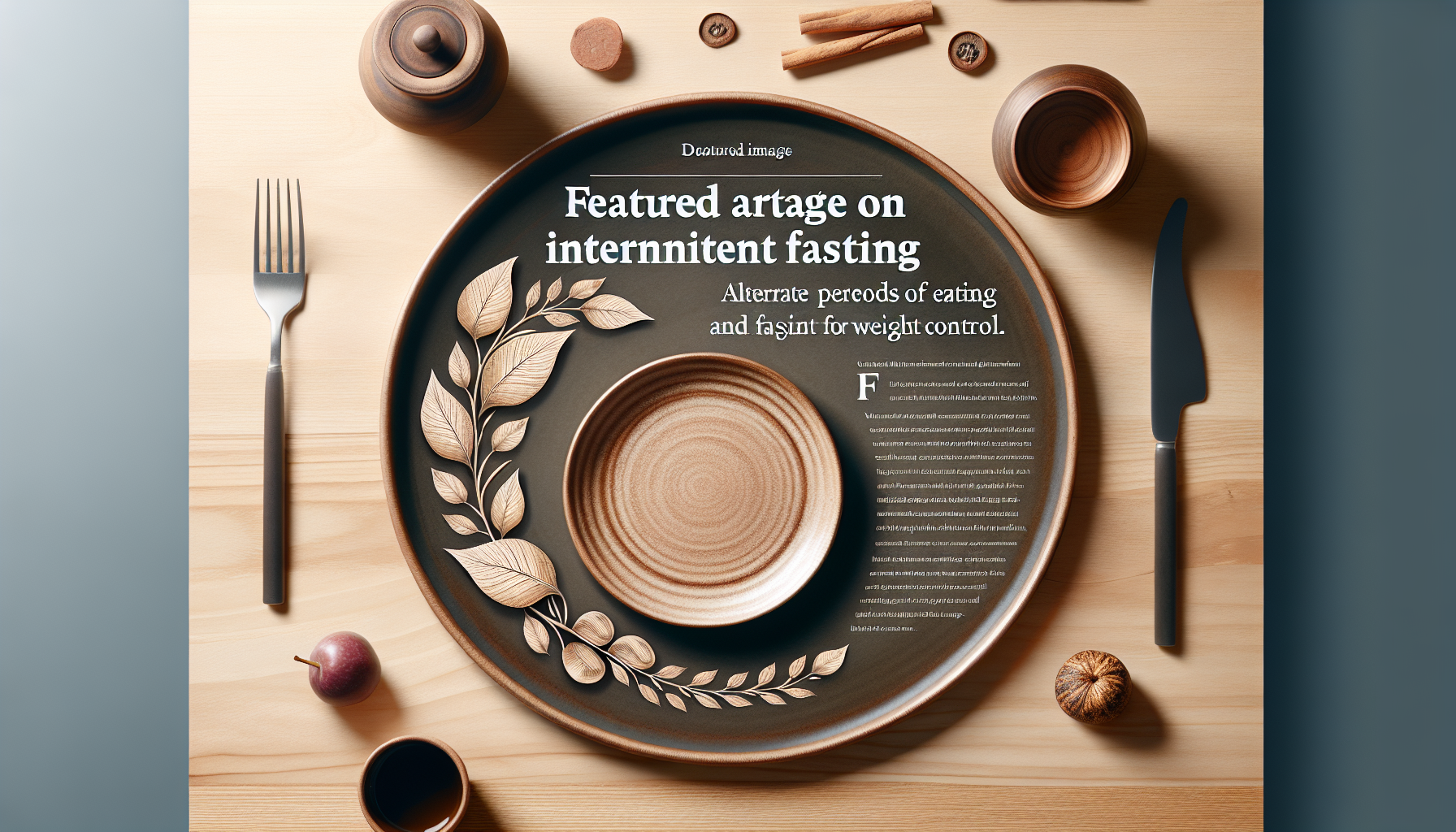Looking to shake up your diet routine? Intermittent fasting might just be the answer you’re searching for. This approach to eating has gained popularity in recent years, and for good reason. By alternating periods of fasting with periods of eating, intermittent fasting offers a range of potential health benefits, including improved weight management, enhanced insulin sensitivity, and increased cellular repair. However, it’s important to approach this diet with caution and consult with a qualified health professional beforehand, as it may not be suitable for everyone. So, let’s dive into the world of intermittent fasting and explore the various benefits, challenges, and recipe suggestions to help you on your health journey.
Discover the Ultimate Weight Loss Secrets Here!
What is Intermittent Fasting?
Explanation of Intermittent Fasting
Intermittent fasting is an eating pattern that involves alternating periods of fasting and eating. It is not a diet in the traditional sense, but rather a way of structuring your meals and timing them to optimize certain health benefits. During the fasting periods, you abstain from consuming calories, but water, tea, and coffee are generally allowed. The length of the fasting and eating windows can vary depending on the specific fasting method you choose to follow.
History of Intermittent Fasting
Intermittent fasting has been practiced for centuries, with various cultures and religions incorporating fasting into their traditions. Some of the earliest recorded instances of fasting can be traced back to ancient Greece, where it was believed to have both physical and spiritual benefits. Fasting has also been a common practice in many religious traditions, such as Islam, Christianity, and Buddhism.
Benefits of Intermittent Fasting
Weight loss
One of the main benefits of intermittent fasting is its potential to aid in weight loss. By restricting the hours in which you consume food, you naturally reduce your calorie intake. Additionally, studies have shown that intermittent fasting can help boost your metabolism, leading to increased fat burning and weight loss.
Improved insulin sensitivity
Intermittent fasting has been shown to improve insulin sensitivity, which is important for maintaining healthy blood sugar levels. When you fast, your body has a chance to regulate its insulin production and reduce insulin resistance, which can help prevent conditions like type 2 diabetes.
Reduced inflammation
Chronic inflammation is a key contributing factor to various health problems, including heart disease, cancer, and obesity. Intermittent fasting has been shown to reduce inflammation markers in the body, potentially lowering the risk of developing these conditions.
Enhanced brain health
Emerging research suggests that intermittent fasting may have a positive impact on brain health and cognitive function. Studies have shown that fasting can increase the production of brain-derived neurotrophic factor (BDNF), a protein that promotes the growth of new neurons and protects brain cells.
Promotes autophagy
Autophagy is a cellular process that involves the removal and recycling of damaged cells and cellular components. Intermittent fasting has been found to trigger autophagy, which can help improve cellular health and potentially reduce the risk of age-related diseases.
Possible anti-aging effects
Some research suggests that intermittent fasting may have anti-aging effects on the body. By reducing oxidative stress, promoting cellular repair, and improving overall health markers, intermittent fasting may help slow down the aging process and increase longevity.
Click Here for Proven Fat-Burning Strategies!
Different Methods of Intermittent Fasting
16/8 method
The 16/8 method of intermittent fasting involves fasting for 16 hours and restricting your eating window to 8 hours. This method is one of the most popular and easiest to implement, as it can be done by simply skipping breakfast and having your first meal later in the day.
5:2 diet
The 5:2 diet involves eating normally for five days of the week and reducing your calorie intake to 500-600 calories for the remaining two non-consecutive days. This method allows for more flexibility in terms of when you choose to fast, as long as there is at least one non-fasting day between the two fasting days.
Alternate day fasting
Alternate day fasting involves alternating between fasting days, where you consume little to no calories, and feeding days, where you eat normally. This method requires a bit more discipline and may not be suitable for everyone, especially those who are new to intermittent fasting.
24-hour fasting
The 24-hour fasting method involves fasting for a full 24 hours once or twice a week. This can be done by fasting from dinner one day until dinner the next day or by skipping two consecutive meals.
Getting Started with Intermittent Fasting
Consulting a healthcare professional
Before embarking on any fasting regimen, it is important to consult with a healthcare professional or registered dietitian. They can assess your individual health needs and provide guidance on whether intermittent fasting is suitable for you.
Choosing the right fasting method
Consider your lifestyle, preferences, and overall goals when choosing an intermittent fasting method. Pick a method that aligns with your routine and is sustainable in the long term.
Creating a fasting schedule
Once you have chosen a fasting method, create a fasting schedule that works for you. Gradually increase the duration of your fasting periods over time to allow your body to adjust gradually.
Tips for a Successful Intermittent Fasting Journey
Stay hydrated
During fasting periods, it is important to stay hydrated. Drink plenty of water throughout the day to prevent dehydration and support your overall health.
Listen to your body
Pay attention to your body’s signals and adjust your fasting schedule if needed. If you feel extremely hungry or unwell during fasting periods, it may be a sign to shorten your fasting window or try a different method.
Eat balanced meals during eating windows
When it’s time to eat, focus on consuming balanced meals that include a variety of nutrients. Include lean proteins, whole grains, fruits, vegetables, and healthy fats to ensure you’re getting all the essential nutrients your body needs.
Choose nutrient-rich foods
Opt for nutrient-dense foods during your eating windows to maximize the health benefits of intermittent fasting. Fill your plate with whole foods like fruits, vegetables, whole grains, lean proteins, and healthy fats.
Stay consistent
Consistency is key when it comes to intermittent fasting. Stick to your chosen fasting schedule as much as possible to allow your body to adapt and maximize the potential benefits.
Consider adding exercise
Incorporating regular exercise into your intermittent fasting routine can further enhance the benefits. Engaging in physical activity can help improve insulin sensitivity, boost metabolism, and aid in weight loss.
Challenges and Potential Side Effects
Hunger and food cravings
One of the main challenges of intermittent fasting is dealing with hunger and food cravings, especially during the initial adjustment period. It may take some time for your body to adapt to the new eating pattern, but cravings typically decrease over time.
Initial adjustment period
When starting intermittent fasting, you may experience some discomfort as your body adjusts to the new eating pattern. This can include symptoms like fatigue, headaches, and irritability. However, these symptoms are usually temporary and tend to subside as your body adapts.
Potential impact on social life
Intermittent fasting can sometimes pose challenges in social situations where food is involved. Planning ahead and communicating with friends and family can help ensure that you can still enjoy social gatherings while sticking to your fasting schedule.
May not be suitable for everyone
Intermittent fasting may not be suitable for everyone, especially those with certain medical conditions or those at risk of disordered eating. If you have a history of eating disorders or any underlying health concerns, it is important to consult with a healthcare professional before starting intermittent fasting.
Intermittent Fasting and Exercise
Exercising during fasting periods
Exercising during fasting periods can be safe and beneficial for some individuals. However, it is important to listen to your body and adjust your workouts accordingly. Some people may find that low-intensity exercises, like walking or yoga, work better during fasting periods, while others may be able to tolerate higher intensity workouts.
Exercising during eating windows
Exercising during eating windows can help maximize the benefits of intermittent fasting. By fueling your body with a balanced meal before or after a workout, you can provide it with the necessary nutrients to promote muscle growth and recovery.
Intermittent Fasting and Women
Effects on hormonal balance
Intermittent fasting may affect hormonal balance differently in women compared to men. Some women may experience changes in menstrual cycles or hormonal imbalances when starting intermittent fasting. It is important to monitor any changes and consult with a healthcare professional if needed.
Considerations for menstrual cycles and fertility
Women who are trying to conceive or have irregular menstrual cycles may want to approach intermittent fasting with caution. It is crucial to discuss any plans for intermittent fasting with a healthcare professional to ensure it won’t negatively impact fertility or hormonal balance.
Pregnancy and breastfeeding
Intermittent fasting is generally not recommended during pregnancy or while breastfeeding. During these periods, it is important to prioritize the nutritional needs of both the mother and the baby. Consult with a healthcare professional for personalized guidance.
Possible Considerations for Specific Groups
Children and teenagers
Intermittent fasting is generally not recommended for children and teenagers, as their bodies are still growing and developing. Adequate nutrition is essential during the formative years, and fasting may interfere with their nutritional needs.
Elderly individuals
Elderly individuals may have unique nutritional requirements, and intermittent fasting should be approached with caution. It is important for elderly individuals to consult with a healthcare professional who can provide appropriate guidance based on their specific health needs.
Individuals with certain medical conditions
Individuals with certain medical conditions, such as diabetes, low blood pressure, or a history of eating disorders, should consult with a healthcare professional before starting intermittent fasting. They may require modifications to their fasting schedule or a different approach altogether.
Athletes and active individuals
Athletes and highly active individuals may have higher caloric needs, and intermittent fasting may not be suitable for them without careful consideration. It is crucial for athletes to consult with a sports nutritionist or healthcare professional who can create an individualized plan to support their athletic performance.
Final Thoughts and Conclusion
Importance of professional guidance
Intermittent fasting can be a powerful tool for improving health and promoting weight loss, but it should not be approached without professional guidance. Consulting with a qualified healthcare professional or registered dietitian is essential to ensure that intermittent fasting is safe and appropriate for your individual health needs.
Personalized approach to health
Every individual is unique, and what works for one person may not work for another. It is important to listen to your body, monitor your progress, and make adjustments as needed. Professional guidance can help you tailor intermittent fasting to your specific health goals and circumstances.
Balancing fasting with a nutritious diet
While intermittent fasting can offer many health benefits, it is crucial to remember that it is just one piece of the puzzle. To optimize your health, it is important to combine intermittent fasting with a balanced and nutritious diet, regular physical activity, adequate sleep, and stress management techniques. Taking a holistic approach to your health will help you achieve long-lasting results and overall well-being.


